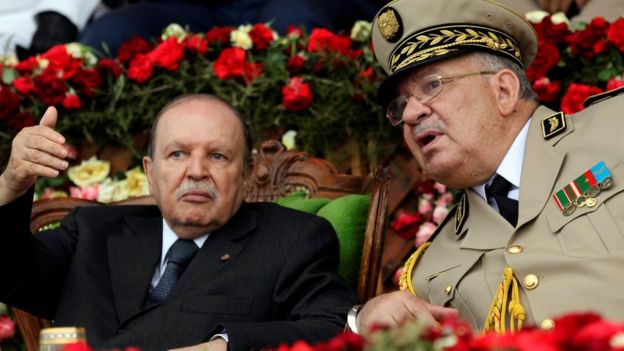What was General Salah's role?
Protests began in February after Mr Bouteflika announced that he would run for re-election. It was the military chief who announced on 26 March that article 102 of the constitution - allowing the president's removal on grounds of ill health - should be applied, which resulted in Mr Bouteflika's resignation. Ahmed Gaid Salah (R) was seen as de facto leader after Mr Bouteflika's resignation
But protesters continued to call for the removal of those around the president, including Gen Salah himself.
As de facto leader, Gen Salah rejected opposition demands for deep reforms, the setting up of transitional institutions and the dismantling of the regime.
Ever since independence, the army has been the real centre of power in Algeria, arbitrating factional conflicts among politicians and business interests, making and unmaking presidents.
Mr Bouteflika himself was brought to the presidency in 1999 by a group of generals who had prosecuted a brutal war against militant Islamist insurgents since 1992.
Gen Salah, head of the army since 2004, was a central figure in this system.
Ahmed Gaid Salah (R) was seen as de facto leader after Mr Bouteflika's resignation
But protesters continued to call for the removal of those around the president, including Gen Salah himself.
As de facto leader, Gen Salah rejected opposition demands for deep reforms, the setting up of transitional institutions and the dismantling of the regime.
Ever since independence, the army has been the real centre of power in Algeria, arbitrating factional conflicts among politicians and business interests, making and unmaking presidents.
Mr Bouteflika himself was brought to the presidency in 1999 by a group of generals who had prosecuted a brutal war against militant Islamist insurgents since 1992.
Gen Salah, head of the army since 2004, was a central figure in this system.

A death likely to impact the president
Analysis by BBC Africa's Ahmed Rouaba Abdelmadjid Tebboune was elected with the lowest turnout ever and will need the support of the new interim army chief of staff to take the country forward and overcome the biggest hurdle - popular protest. In order to engage with the protesters, who still reject his election, Mr Tebboune has promised to carry out the necessary reforms to meet their demands including fighting corruption among the powerful and the elite. Will he still be able to fulfil his promises and find dialogue with the protesters to get the whole country behind him? The unexpected death of Gen Salah will certainly affect President Tebboune, who has lost a major supporter in his attempt to take the country forward and overcome the political crisis.
Who was General Salah?
- Born in 1940 in Batna region, 300km (186 miles) east of Algiers
- Joined National Liberation Army aged 17, and fought against French colonial forces
- Fought in the 1967 and 1973 Arab-Israeli wars
- After independence in 1962 attended Soviet military academy and rose through ranks
- Chief of land forces during civil war against Islamist insurgents in 1990s
DISCLAIMER: The Views, Comments, Opinions, Contributions and Statements made by Readers and Contributors on this platform do not necessarily represent the views or policy of Multimedia Group Limited.
Latest Stories
-
Ghana’s Antoine Semenyo fires Bournemouth to victory against Wolves
5 mins -
Everton 2-0 Liverpool: Everton apply final blow to Liverpool title challenge
14 mins -
Akufo-Addo nominates Felicia Attipoe as Tema West MCE
16 mins -
Today’s front pages: Thursday, April 25, 2024
24 mins -
We’ll not engage in opaque and obscure deals when elected – Prof Opoku-Agyemang
50 mins -
Energy and Finance Ministries must provide funding to fix energy challenges – IES
57 mins -
Reintroduce Fiscal Responsibility Act to tackle election budget overrun – Osafo Marfo
58 mins -
Prioritise transparency, avoid suppressing the truth – Opoku-Agyemang advises EC
1 hour -
In times of setbacks, I won’t say I was only the driver’s mate – Naana Jane assures Mahama
1 hour -
Joselyn Dumas opens up on why single mothers struggle to find partners
1 hour -
Three damaged ECG pylons result in power outage for 9 Shama communities
1 hour -
Dual citizens eligible for Chief Justice, Chief Director, other positions – Supreme Court rules
2 hours -
SIGA urges increased financial support for SOEs
2 hours -
Akufo-Addo vows to enhance Ghana’s power supply
2 hours -
19 steps for getting over even the most devastating breakup fast
5 hours

